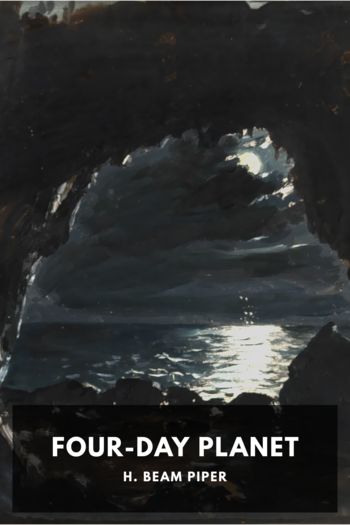Four-Day Planet - H. Beam Piper (i wanna iguana read aloud TXT) 📗

- Author: H. Beam Piper
Book online «Four-Day Planet - H. Beam Piper (i wanna iguana read aloud TXT) 📗». Author H. Beam Piper
They knew me, and when they saw Tom towing my hamper they cracked a few jokes about the new Times cub reporter and waved us through. I thought they might give Bish an argument, but they just nodded and let him pass, too. We all went out onto the bridge, and across the pit to the equator of the two-thousand-foot globular ship.
We went into the main lounge, and the captain introduced us to Mr. Glenn Murell. He was fairly tall, with light gray hair, prematurely so, I thought, and a pleasant, noncommittal face. I’d have pegged him for a businessman. Well, I suppose authoring is a business, if that was his business. He shook hands with us, and said:
“Aren’t you rather young to be a newsman?”
I started to burn on that. I get it all the time, and it burns me all the time, but worst of all on the job. Maybe I am only going-on-eighteen, but I’m doing a man’s work, and I’m doing it competently.
“Well, they grow up young on Fenris, Mr. Murell,” Captain Marshak earned my gratitude by putting in. “Either that or they don’t live to grow up.”
Murell unhooked his memophone and repeated the captain’s remark into it. Opening line for one of his chapters. Then he wanted to know if I’d been born on Fenris. I saw I was going to have to get firm with Mr. Murell, right away. The time to stop that sort of thing is as soon as it starts.
“Who,” I wanted to know, “is interviewing whom? You’ll have at least five hundred hours till the next possible ship out of here; I only have two and a half to my next deadline. You want coverage, don’t you? The more publicity you get, the easier your own job’s going to be.”
Then I introduced Tom, carefully giving the impression that while I handled all ordinary assignments, I needed help to give him the full V.I.P. treatment. We went over to a quiet corner and sat down, and the interview started.
The camera case I was carrying was a snare and a deceit. Everybody knows that reporters use recorders in interviews, but it never pays to be too obtrusive about them, or the subject gets recorder-conscious and stiffens up. What I had was better than a recorder; it was a recording radio. Like the audiovisuals, it not only transmitted in to the Times, but made a recording as insurance against transmission failure. I reached into a slit on the side and snapped on the switch while I was fumbling with a pencil and notebook with the other hand, and started by asking him what had decided him to do a book about Fenris.
After that, I fed a question every now and then to keep him running, and only listened to every third word. The radio was doing a better job than I possibly could have. At the same time, I was watching Steve Ravick, Morton Hallstock and Leo Belsher at one side of the room, and Bish Ware at the other. Bish was within ear-straining range. Out of the corner of my eye, I saw another man, younger in appearance and looking like an Army officer in civvies, approach him.
“My dear Bishop!” this man said in greeting.
As far as I knew, that nickname had originated on Fenris. I made a mental note of that.
“How are you?” Bish replied, grasping the other’s hand. “You have been in Afghanistan, I perceive.”
That did it. I told you I was an old Sherlock Holmes reader; I recognized that line. This meeting was prearranged, neither of them had ever met before, and they needed a recognition code. Then I returned to Murell, and decided to wonder about Bish Ware and “Dr. Watson” later.
It wasn’t long before I was noticing a few odd things about Murell, too, which confirmed my original suspicions of him. He didn’t have the firm name of his alleged publishers right, he didn’t know what a literary agent was and, after claiming to have been a newsman, he consistently used the expression “news service.” I know, everybody says that—everybody but newsmen. They always call a news service a “paper,” especially when talking to other newsmen.
Of course, there isn’t any paper connected with it, except the pad the editor doodles on. What gets to the public is photoprint, out of a teleprinter. As small as our circulation is, we have four or five hundred of them in Port Sandor and around among the small settlements in the archipelago, and even on the mainland. Most of them are in bars and cafés and cigar stores and places like that, operated by a coin in a slot and leased by the proprietor, and some of the big hunter-ships like Joe Kivelson’s Javelin and Nip Spazoni’s Bulldog have them.
But long ago, back in the First Centuries, Pre-Atomic and Atomic Era, they were actually printed on paper, and the copies distributed and sold. They used printing presses as heavy as a spaceship’s engines. That’s why we still call ourselves the Press. Some of the old papers on Terra, like La Prensa in Buenos Aires, and the Melbourne Times, which used to be the London Times when there was still a London, were printed that way originally.
Finally I got through with my interview, and then shot about fifteen minutes of audiovisual, which would be cut to five for the ’cast. By this time Bish and “Dr. Watson” had disappeared, I supposed to the ship’s bar, and Ravick and his accomplices had gotten through with their conspiracy to defraud the hunters. I turned Murell over to Tom, and went





Comments (0)